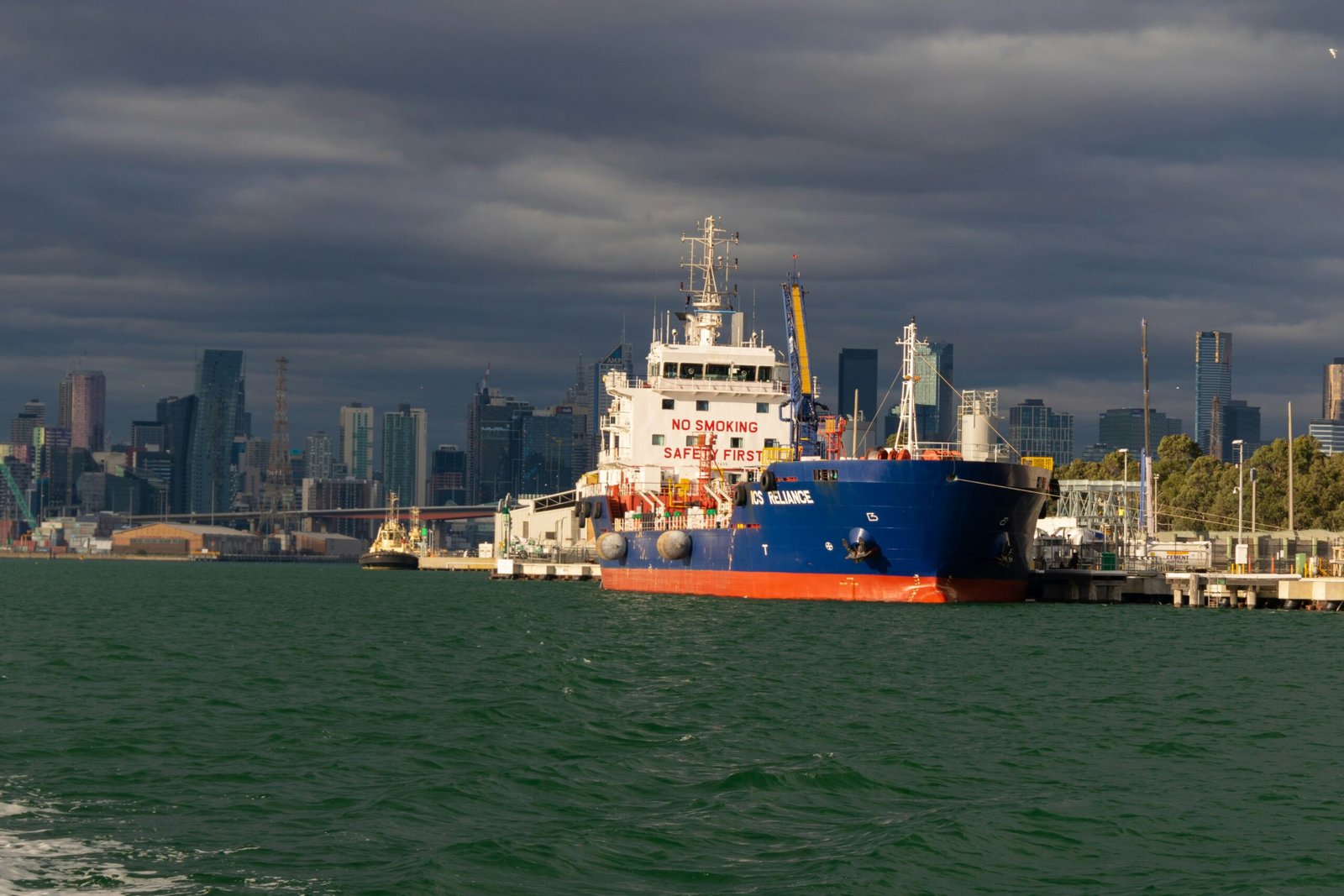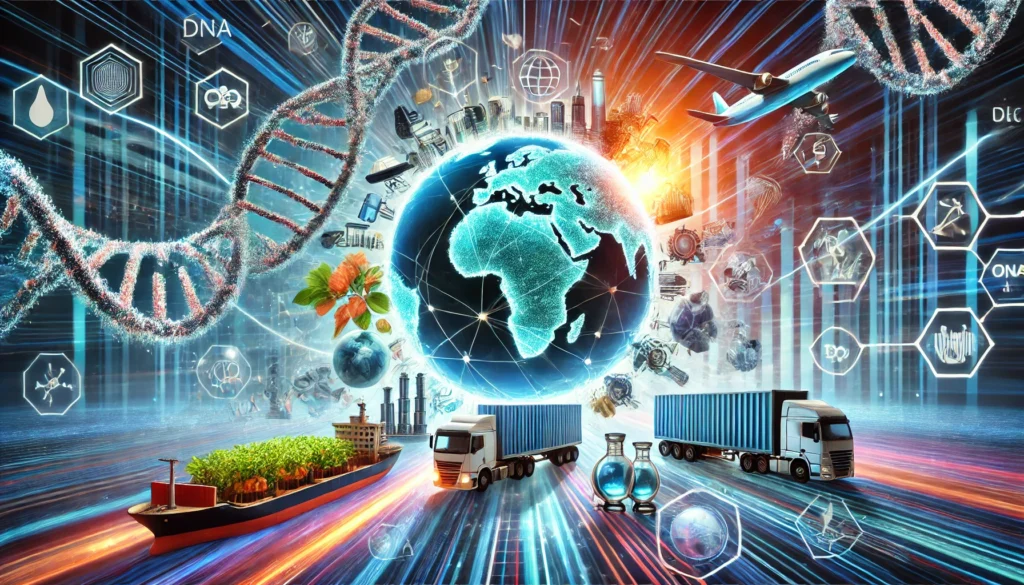Introduction to AI in International Trade
Artificial Intelligence (AI) is increasingly becoming an integral part of international trade, transforming the landscape of importing and exporting practices globally.
As nations strive to enhance the efficiency and reliability of their trade processes, the integration of AI technologies is facilitating streamlined operations.
In 2024, businesses engaged in the export from India and other countries are leveraging these advancements to optimize their supply chains, mitigate risks, and make informed decisions.
The current state of the import-export sector revolves around traditional methods, which often encompass manual tasks and reliance on human intuition.
However, with the advent of AI, companies are witnessing a significant shift towards automation and data-driven solutions.
AI-driven systems can analyze vast amounts of data to predict market trends, assess risks, and recommend actions based on real-time information.
This allows exporters to respond swiftly to changes in demand, price fluctuations, and regulatory challenges.
Moreover, AI tools are enhancing the accuracy of trade forecasting and improving inventory management.
For instance, machine learning algorithms can predict which products are likely to succeed in specific markets, thus aiding in strategic decision-making for businesses involved in export from India.
Additionally, AI-powered chatbots and customer service systems are improving communication and engagement with clients, further strengthening international partnerships.
As we move into 2024, the significance of these advanced technologies in enhancing trade efficiency cannot be overstated.
The ability to analyze data in real-time, optimize logistical operations, and ensure compliance with international regulations will make AI indispensable for businesses focused on global trade.
The evolving role of AI in this realm signals a future where cross-border trade is more efficient, reliable, and ultimately more profitable.
Impact of AI on Supply Chain Management
The integration of artificial intelligence (AI) into supply chain management has revolutionized how businesses approach the complexities of global trade, including the export from India.
By leveraging advanced technologies such as predictive analytics, organizations can now more accurately forecast demand and optimize inventory management.
This transformation in supply chain dynamics leads to increased efficiency, reduced costs, and improved service levels.
One of the key applications of AI in supply chain management is demand forecasting.
Traditional methods often relied on historical data and static models; however, AI allows for a more dynamic analysis.
By analyzing various factors such as market trends, seasonal variations, and consumer behavior, AI can predict demand with greater precision.
For instance, companies like Unilever have implemented AI-powered tools that analyze complex variables to forecast product demand, resulting in a more streamlined export from India to various markets.
Moreover, inventory management has significantly benefitted from AI’s capabilities.
Automated systems powered by machine learning algorithms can continuously monitor stock levels and suggest optimal reorder points, minimizing excess inventory and reducing associated costs.
For example, Walmart utilizes machine learning to enhance its inventory management processes.
This approach ensures that products are available when needed, thereby supporting their extensive export operations, including those from India.

Real-world implementations further demonstrate the advantages of AI in supply chain management.
Companies like Amazon utilize AI for route optimization and warehouse management, ensuring timely deliveries and efficient order processing.
By enhancing logistical efficiencies, AI not only facilitates smoother operations but also strengthens competitive advantage in global markets.
In conclusion, the impact of artificial intelligence on supply chain management is profound. By implementing AI-driven solutions, organizations can significantly enhance their operations, optimize inventory, and ultimately support effective export from India and beyond.
Automation of Customs and Compliance Procedures
Artificial Intelligence (AI) is considerably transforming the realm of customs and compliance procedures in international trade.
The intricacies involved in customs processes often lead to delays and increased costs, hampering the efficiency of product imports and exports.
However, with the integration of AI technologies, there has been a significant shift toward the automation of these complex procedures, streamlining operations and enhancing overall efficiency.
One of the principal benefits of AI in customs is the automation of documentation. Traditionally, businesses faced challenges in preparing the extensive paperwork required for customs clearance.
AI-powered systems can now automatically generate the necessary documents by extracting data from various sources, subsequently reducing human error and expediting the process.
This not only allows companies engaged in exports from India to save time but also ensures adherence to compliance requirements established by international trade regulations.
AI also plays a critical role in tariff classification.
By employing machine learning algorithms, it can analyze past data and assist in categorizing products under the correct tariff codes.
This is particularly beneficial for entities involved in exports from India, ensuring that they meet compliance obligations and avoid costly penalties associated with misclassification.
Furthermore, these automated systems can offer real-time updates on tariff changes, keeping businesses informed and compliant with evolving regulations.
Risk assessment is another area where AI significantly enhances customs procedures.
By utilizing predictive analytics, AI can evaluate the risk associated with shipments, identifying those that require additional scrutiny.
Such a proactive approach reduces the likelihood of delays at customs while enhancing overall security in international trade.
As businesses increasingly leverage AI-powered tools to streamline customs and compliance processes, the efficiency of product imports and exports is expected to improve markedly.
Enhanced Data Analysis and Insights
Artificial Intelligence (AI) has emerged as a pivotal tool in enhancing data analysis, significantly transforming the landscape of product imports and exports.
By employing machine learning algorithms and data processing capabilities, AI enables businesses to analyze large volumes of data efficiently.
This capability is particularly crucial for understanding market trends, competitor strategies, and customer preferences, which are vital aspects for any enterprise engaging in trade.
In the dynamic global market, identifying the right opportunity and making data-driven decisions can be the difference between success and failure.
AI facilitates advanced data analytics by aggregating data from various sources, including social media, market reports, and historical sales data.
This comprehensive analysis allows importers and exporters to discern patterns that would otherwise go unnoticed.
For instance, through AI, businesses can monitor shifts in consumer behavior indicative of changing market demands, allowing them to tailor their offerings strategically.
As a result, the capability to effectively export from India or any other country becomes significantly enhanced.
Moreover, AI can provide predictive insights by learning from past behaviors, enabling companies to forecast potential trends in exports and imports.
Such insights empower organizations to adapt their strategies proactively rather than reactively.
By analyzing competitor activities, AI tools can highlight strengths and weaknesses within the market, informing participants about potential risks and opportunities associated with trade routes and product offerings.
Ultimately, the integration of AI in data analysis helps businesses make informed choices that align with their trading goals.
The ability to generate actionable insights ensures that companies engaged in export from India, or in any other region, remain competitive and responsive to the ever-evolving market dynamics, thereby enhancing their operational efficiency and strategic positioning.
Improving Customer Experience Through AI
Artificial intelligence (AI) has emerged as a powerful tool in revolutionizing customer experience in the import-export sector.
By leveraging AI technologies, businesses can offer enhanced customer interactions that lead to improved service delivery and heightened satisfaction.
One of the most notable advancements in this area is the implementation of chatbots, which provide instant responses to customer inquiries, thus streamlining the communication process.
These AI-driven tools can handle a myriad of questions ranging from shipping timelines to customs regulations, significantly reducing wait times and improving efficiency.
Moreover, AI facilitates personalized communication, allowing companies to offer tailored experiences that meet specific customer needs.
By analyzing customer data and behavior, AI systems can suggest appropriate services, products, and solutions that align with the preferences of individual clients engaged in import and export from India.
This level of customization not only enhances the overall user experience but also fosters customer loyalty, which is essential in a competitive landscape increasingly driven by technological advancements.
In the digital age, consumers expect quick responses and seamless interactions; thus, businesses in the import-export industry must adapt to these expectations to remain relevant.
The ability to offer 24/7 support through AI tools ensures that customers can obtain the assistance they require at any time.
Furthermore, AI can analyze customer feedback and experience data to refine strategies, maintaining high standards of service delivery and engagement.
As companies improve their customer experience through AI, they create a robust competitive advantage, especially in the global market where export from India is gaining traction across various industries.
Overall, the integration of AI technologies in customer service not only aids in resolving issues efficiently, but also cultivates a deeper connection with clients.
This is crucial for sustaining long-term relationships, fostering brand loyalty, and ultimately driving growth in the dynamic field of international trade.
AI-Driven Logistics Optimization
In the realm of international trade, efficient logistics and transportation are paramount for the seamless export from India, enhancing the overall competitiveness of products on the global stage.
The integration of Artificial Intelligence (AI) in logistics systems is revolutionizing how businesses manage their supply chains.
Companies are leveraging AI to achieve route optimization, improve fleet management, and reduce shipping costs, thereby streamlining the export processes.
One significant application of AI is in route optimization. Advanced algorithms analyze traffic patterns, weather conditions, and historical data to determine the most efficient pathways for transportation.
This enables businesses to minimize delivery times and fuel consumption, which directly impacts operational costs.
For instance, a leading logistics firm utilized AI technologies to revamp its route planning, resulting in a 20% reduction in transportation costs and improved delivery times.
This optimization is particularly beneficial for companies engaged in the export from India, where timely delivery is critical to maintaining customer satisfaction and competitive pricing.
Fleet management is another area where AI is making strides. By employing AI-powered tools, logistics companies can monitor vehicle performance, predictive maintenance, and driver behavior.
These insights help in managing resources efficiently, reducing downtime, and ensuring that the fleet operates at optimal capacity.
A case study involving an international freight firm highlighted the deployment of AI in fleet management, which led to a significant decrease in operational costs and enhanced service quality.
Moreover, AI can assist in shipping cost reduction strategies by predicting demand, managing inventory levels, and optimizing warehouse operations.
This comprehensive approach to logistics not only enhances the performance of individual companies but also contributes to the overall efficiency of the export framework from India, fostering a more robust international trade ecosystem.
Addressing Challenges and Risks of AI in Trade
The integration of Artificial Intelligence (AI) into trade, particularly in the import and export sector, presents various challenges and risks that must be carefully managed.
The reliance on data-driven algorithms raises significant concerns regarding data privacy.
As organizations gather extensive information to optimize their export from India, there is an increasing risk of data breaches and the misuse of sensitive information.
Companies must ensure that they comply with international data protection regulations to safeguard their customer’s data while integrating AI technologies.
Another notable challenge is the ethical implications of AI. Decisions made by AI systems can sometimes lack transparency, leading to questions regarding bias and fairness.
For instance, if an algorithm inadvertently favors certain suppliers unfairly, it can undermine the integrity of the trade system.
Addressing this requires organizations to implement robust oversight mechanisms and foster collaboration between AI developers and legal experts to devise ethical frameworks that govern AI applications in imports and exports.
Furthermore, the rapid automation facilitated by AI has led to concerns about job displacement within the trade sector. Many workers fear that their roles may become obsolete due to increasing reliance on AI-driven processes.
Consequently, companies should prioritize upskilling and reskilling initiatives to prepare their workforce for the evolving landscape of trade and ensure job security.
By providing training in AI literacy and related skills, businesses can empower employees to work alongside AI technologies rather than compete against them.
To mitigate these risks effectively, stakeholders in the import and export industry must adopt a comprehensive approach that involves careful planning, ongoing monitoring, and adaptive strategies.
A balanced approach will not only harness the benefits of AI but also address the challenges posed by its implementation, ensuring a more robust and ethical trade environment.
Future Trends: AI’s Role in Trade Innovations
The influence of artificial intelligence (AI) on international trade is poised to grow significantly in the coming years, with several emerging trends reshaping how companies manage their export from India and other countries.
One prominent area is the integration of blockchain technology, which promises to enhance transparency and security in trade transactions.
By utilizing decentralized ledgers, parties involved in cross-border trade can track the provenance of goods, authenticate transactions, and effectively mitigate risks associated with fraud and trade disputes.
As more countries and businesses adopt these systems, the efficiency of the export process is expected to improve profoundly.
Another significant trend is the development of real-time tracking systems. With the aid of AI and the Internet of Things (IoT), companies can now gather and analyze extensive data pertaining to their supply chains.
This capability allows businesses to monitor shipment conditions in real-time, predict potential disruptions, and make informed decisions swiftly.
For exporters in India, such innovations can optimize interactions with logistics companies, enhancing delivery times and reducing costs, ultimately leading to a more competitive edge in the global market.
Furthermore, autonomous shipping solutions are on the rise, leveraging AI technologies to revolutionize the traditional shipping model.
The advent of unmanned vessels and drones holds the potential to reduce reliance on human labor, decrease shipping times, and cut operational expenses.
As these technologies continue to advance and gain regulatory approval, they could significantly transform the landscape of international trade, particularly for nations reliant on export from India and other manufacturing hubs.
In conclusion, the future of international trade will undoubtedly be shaped by the integration of AI-driven innovations like blockchain, real-time tracking systems, and autonomous shipping.
These advancements not only promise enhanced operational efficiency but also create new opportunities for businesses engaged in the import and export of goods worldwide.
Conclusion: Embracing AI for Competitive Advantage
As we have explored throughout this blog post, the integration of Artificial Intelligence (AI) into the product import and export sectors has significantly altered the landscape of global trade.
The transformative power of AI technologies offers industry stakeholders the ability to streamline processes, enhance decision-making, and improve customer experiences, which are crucial for maintaining competitiveness in an increasingly complex marketplace.
The ability to analyze vast amounts of data quickly allows businesses to adapt to market changes, predict trends, and meet consumer demands more efficiently.
AI’s role in optimizing logistics cannot be overlooked. With advanced predictive analytics and machine learning algorithms, companies can enhance their supply chain management, reducing costs and minimizing delays.
This is particularly significant for businesses engaged in export from India, where timely delivery and efficient operations play a pivotal role in ensuring customer satisfaction and loyalty.
Furthermore, the utilization of AI-driven platforms facilitates improved compliance and risk management, thus ensuring smoother cross-border transactions.
The potential of AI in shaping the future of the import-export industry is evident, yet it requires a proactive approach from stakeholders.
Embracing these technological advancements is no longer a choice but a necessity for survival in the market dynamics of 2024 and beyond.
Industry leaders must invest in training and resources to harness AI’s full potential, create innovative solutions, and adapt their business models accordingly.
By doing so, they not only position themselves for immediate benefits but also lay the groundwork for long-term success.
Ultimately, the journey of implementing AI in the realm of international trade is a collaborative effort.
Whether one is involved in import processes or export from India, the shared goal remains clear: to leverage AI-driven innovations to stay ahead of the competition and effectively navigate the evolving landscape of global commerce.






No comment yet, add your voice below!